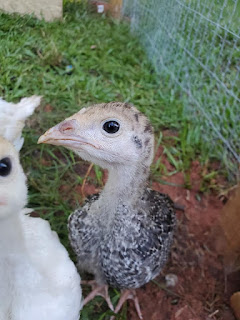Turkeys are one of the most difficult poultry livestock to raise, it's not impossible but it isn't easy either. I remember as a kid that we had four turkeys but I didn't know what all was done to make it a successful task. In 2020, we decided to take on the daunting task of raising turkeys. And one of the main reasons was because we eat a lot of ground turkey and at the time ground turkey was over $5 a pound. So after doing some research I ordered 15 turkeys.
I researched where would be the best place to get my turkeys from and read a lot of reviews. I ended up going through Welp Hatchery and the customer service there was amazing. A few weeks later we received 15 turkeys (5 broad breasted bronze, 5 giant whites, and 5 chocolate). And if you are interested in what types of turkeys they have here is the link: https://www.welphatchery.com/turkeys/.
So the day came and I received the phone call from the post office that our poults had arrived. And I was excited. I had already went out and purchased some feed that was high on protein because this is very important for turkeys especially when they first start out. Also, I made sure that I had a heat lamp and a brooder for them. Well within the first two weeks, I lost two chocolate turkeys. So my flock was now down to 13 poults. And to this day I just don't know why they died, but in my experience I have seen that turkeys are weak when they are young and find ways to die. So along with the high protein feed, I would put a teaspoon of apple cider vinegar in their water which helped them and seemed to give them more energy.
After having them a month I started letting them outside in another brooder and let them just get fresh air. Well one day it started to sprinkle and low and behold these turkeys are standing there looking up to the sky with their mouths open. I remember my dad telling me that poults will drown themselves when it rains. So I did a mad dash and put them back inside in the brooder. Well a few days later one of my giant white poults was dead. Now my flock is down to 12.
After 7 months of raising the turkeys I had 11 still and it was processing time. I had 6 gobblers and 5 hens. Our plan on this homestead is that we would keep 4 or 5 to help replenish the flock for the next few years so we would not have to keep purchasing more poults. A turkey hen can have between 12 to 15 poults and if we keep 3 hens and one or two gobblers then we could replenish our flock for a few years. So that is our plan for this part of the homestead. However, there is one thing to add. Turkeys much rather sleep under the stars than in a coop. If we do not put them in the coop at nights I will find them roosting on our privacy fence or on top of the coop. So I recommend that you feed them in the coops in the evening and then shut the coop.
I am still learning and researching because they will through you for a loop just when you weren't expecting it. They are curious and very aggressive when it comes to eating. And they like shiny things like rings and they will peck them too. But this experience has been fun and I have learned a lot. So stay tuned to more posts about our homestead and a few tips from the things we learned.




No comments:
Post a Comment